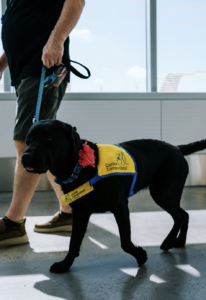 In homes around the world, dogs are more than just pets; they are family members, confidants, and sometimes, even healers. Beyond their ability to offer unconditional love and companionship, some dogs have the remarkable ability to detect and respond to human health conditions, often before we’re even aware of them ourselves. This ability, combined with their positive impact on human mental health, underscores the profound healing power of our canine companions.
In homes around the world, dogs are more than just pets; they are family members, confidants, and sometimes, even healers. Beyond their ability to offer unconditional love and companionship, some dogs have the remarkable ability to detect and respond to human health conditions, often before we’re even aware of them ourselves. This ability, combined with their positive impact on human mental health, underscores the profound healing power of our canine companions.
Dogs’ Ability to Detect Illness
Cancer Detection:
Scientific studies have shown that dogs can sniff out cancer with astonishing accuracy. Dogs have been trained to detect specific types of cancer through smell, including lung, breast, and skin cancer. The theory is that cancerous cells release different metabolic waste products than healthy cells, which dogs can detect in a person’s breath, sweat, or urine.
Diabetes Alert Dogs:
Diabetes alert dogs are trained to detect hypoglycemia (low blood sugar) in individuals by recognizing the scent of low blood sugar levels from human breath or sweat. These dogs are trained to alert their owners to take action to raise their blood sugar levels, often before the person feels symptoms, preventing a potential medical emergency.
Seizure Alert Dogs:
Although the mechanism isn’t fully understood, some dogs appear to have the innate ability to detect upcoming epileptic seizures. These dogs may show behaviour changes or become unusually attentive to their owner before a seizure occurs. This can provide invaluable minutes for the person to prepare or seek help, potentially preventing injury.
 Enhancing Mental Health
Enhancing Mental Health
Emotional Support:
Dogs provide significant emotional support. For individuals suffering from depression, anxiety, or stress, the presence of a dog can serve as a calming agent. The simple act of petting a dog has been shown to reduce stress levels by increasing levels of oxytocin, a stress-reducing hormone, and decreasing production of cortisol, a stress hormone.
Companionship:
Loneliness can be a huge factor in mental health issues. Dogs provide constant companionship, alleviating feelings of isolation. For the elderly or those who live alone, having a dog can make a substantial difference in their everyday mood and outlook.
Routine and Purpose:
Dogs require a routine of feeding, exercise, and grooming, which can help their owners maintain a daily routine and sense of purpose. This can be particularly beneficial for individuals facing mental health challenges, as maintaining a routine can help keep symptoms such as depression and anxiety at bay.
Personal Stories
Beyond the scientific evidence, countless personal testimonials speak to the health benefits of dogs. From stories of dogs persistently sniffing at a mole that turned out to be cancerous, to tales of dogs waking their owners up in the middle of the night during a hypoglycemic episode, the anecdotes are as compelling as they are heart-warming.
…
As research continues to delve into the capabilities and impacts of dogs on human health, it becomes increasingly clear that dogs have a unique ability to not only enrich our lives but to enhance and protect our health in ways we are only beginning to understand. The bond between dogs and humans is deeply symbiotic, marked by an exchange of care and companionship that often transcends into the realm of healing and health support. Whether it’s through their ability to detect disease or their unyielding emotional support, dogs genuinely deserve their title as man’s best friend.